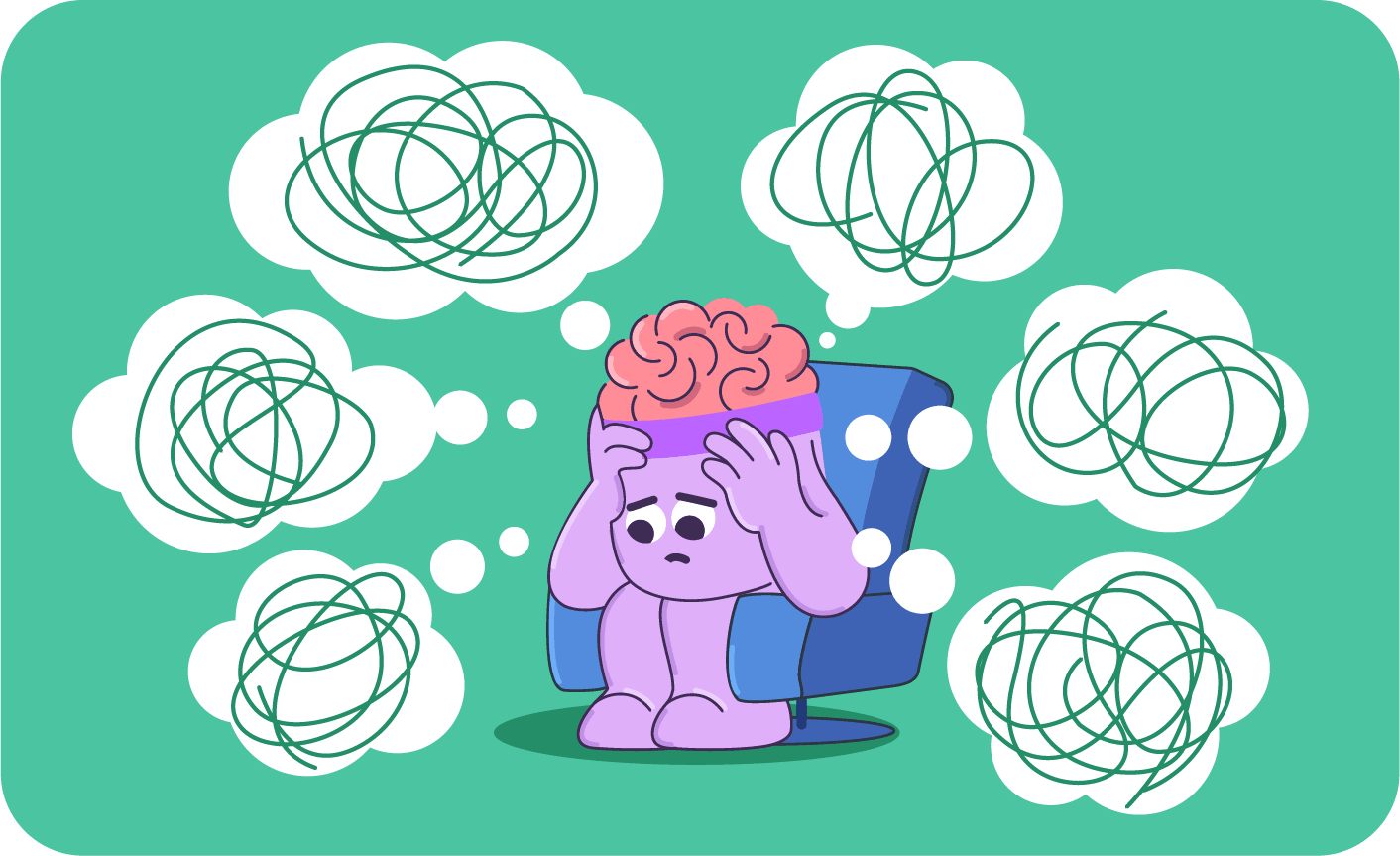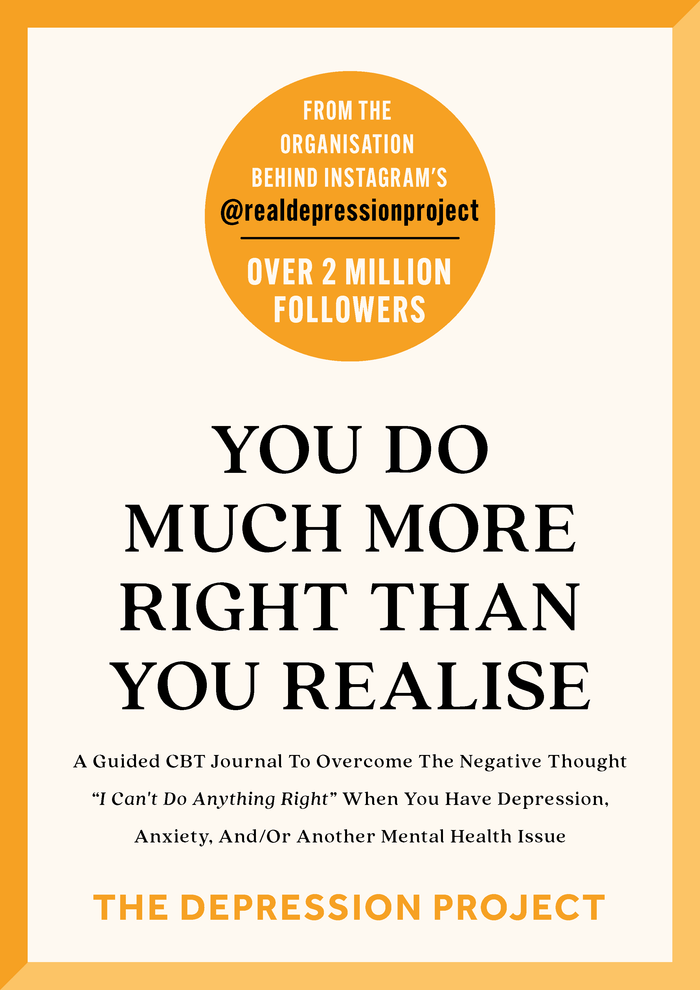If you have depression, anxiety, and/or another mental health issue - or even if you don't - it can be common to experience the negative thought "I can't do anything right". In particular, this can often take place when:
- You're put down and criticised by other people;
- You make a mistake (even a small one);
- You believe you are failing at something.
However, the negative thought "I can't do anything right" is just that - a negative thought - rather than a fact. And, to help you see this, we'd now like to share with you a free excerpt from one of our journals that identifies six thinking patterns that can falsely convince you "I can't do anything right".
Are you ready?
6 Cognitively Distorted Thinking Patterns That Can Falsely Convince You "I Can't Do Anything Right"
In case you don't know, “cognitive distortions” are distorted thinking patterns that are grounded in some form of bias, and which commonly result in you viewing yourself and/or the world much more critically, judgementally and negatively than you otherwise would1. And, when you have the negative thought “I can’t do anything right”, you’re almost certainly thinking in a cognitively distorted way without even knowing it. For this reason, it’s extremely important that you identify- and bring awareness to the ways in which you may be doing so.
Why?
Because if you’re able to recognise that the negative thought “I can’t do anything right” is indeed a cognitive distortion – as opposed to being an accurate perception of reality – then it will become easier for you to dismiss it and push it from your mind (or at the very least, this negative thought will likely lose some of its power over you).
Now, to help you do this, let’s identify some cognitive distortions that commonly plague people who experience the negative thought “I can’t do anything right”.
"I Can't Do Anything Right" Cognitive Distortion #1: Filter Thinking
“Filter thinking” is where you filter out all of the “good” or the “positive” in a situation, and only focus on the “bad” or the “negative”. In practice, this can take the form of, for example:
- Filtering out all of the things you’ve done well and competently, and thinking “I can’t do anything right” because you’re focusing exclusively on a mistake you’ve made or something you’ve done wrong.
- Filtering out all of the positive feedback you received from someone, and thinking “I can’t do anything right” because you’re focusing exclusively on the constructive criticism they gave you to help you do better next time.
- Filtering out all of the things you’ve done successfully in your life, and thinking “I can’t do anything right” because you’re focusing exclusively on something you feel like you’re failing at.
"I Can't Do Anything Right" Cognitive Distortion #2: Catastrophisation
Catastrophisation is when you blow something out of proportion, and conclude that things are much worse than they really are. For example:
- Thinking “I can’t do ANYTHING right” in response to making a small mistake (which may be frustrating, but certainly doesn’t mean that you can’t do ANYTHING right).
- Thinking “I can’t do ANYTHING right” in response to your boss giving you constructive criticism for a presentation you gave (which may be upsetting, but just means that you have room for improvement in this particular area – not that you can’t do ANYTHING right).
- Thinking “I can’t do ANYTHING right” in response to feeling like you’re failing at something (which may be disappointing, but just means that right now, you aren’t doing as well as you would like to in that particular area – not that you can’t do ANYTHING right).
"I Can't Do Anything Right" Cognitive Distortion #3: Personalisation
“Personalisation” is where you take personal responsibility for things that aren’t in your control, that have nothing to do with you, and/or that aren’t your fault. In particular, an example of this would be thinking “I can’t do anything right” in response to being criticised by someone – when in actuality, that person’s criticism may say absolutely nothing about you, your capabilities or your worth as a person, and instead be a reflection of them. This can be the case when, for example:
- The person criticising you is unhappy with something in their own life, and is taking their anger, frustration and/or misery out on you by being overly critical, judgmental and/or snappy.
- The person criticising you may have low self-esteem and/or be jealous of you – and therefore criticises you and tries to tear you down in a hurtful, careless, misguided attempt to try to lift themselves up.
- Another person’s criticism may reflect their own values about whatever it is they’re criticising you about, but not necessarily yours. For example:
- You mother-in-law may really value having a spotlessly clean house, but having a spotlessly clean house may be much lower on your personal priority list, and so you don’t clean it as often as your mother-in-law cleans her own house. Consequently, this may result in your mother-in-law always criticising you for “having a messy house”.
- Your parents may value status and money, but you may value doing a (less prestigious and lower-paying) job that you enjoy. As a result, your parents may constantly criticise you for “lacking ambition” and/or for “not having a good job”.
- Similarly, another person’s criticism may simply reflect their own rigid, closed-minded views of the world, as opposed to your capabilities or worth as a person. For example, your parents criticising you for being unmarried could be a reflection of their rigid, closed-minded belief that “you MUST be married by age X – otherwise you’re failing at life!”
- Another person’s criticism may also reflect the fact that they don’t understand depression, anxiety and/or another mental health issue very well at all. An example of this would be someone criticising you for being “lazy and useless” because you spent most of the weekend in bed – without understanding that depression can make you feel completely, utterly and debilitatingly exhausted, and that for this reason, it can at times be extremely natural to spend much more time in bed than you otherwise would when you have depression.
- Another person’s criticism may also just reflect the reality that they’re simply a very critical person in general – not just of you, but of other people, and also of themselves. In fact, it’s common for people who are extremely critical of others to also be extremely critical of themselves.
"I Can't Do Anything Right" Cognitive Distortion #4: Overgeneralisation
Overgeneralisation is where you make broad, big-picture statements or conclusions about something based on limited information or evidence. This is exactly what you’re doing when you have the sweeping thought “I can’t do ANYTHING right” in response to making a mistake or feeling as if you’re “failing” at something, for example – when a much fairer and more accurate thought would be:
- “On this particular occasion, I made a mistake.”
- “This is one of those times when so far, I haven’t performed as well as I wanted to.”
"I Can't Do Anything Right" Cognitive Distortion #5: Minimisation
Minimisation can involve downplaying or ignoring the presence of external factors that contributed to what it is that you’re feeling negative about. For example, thinking “I can’t do anything right” for forgetting to do something – but completely discounting / ignoring the fact that depression, anxiety and other mental health issues can make it difficult to concentrate and think anywhere near as clearly as you otherwise would. For this reason, in this example, the fact that you’re struggling with symptoms of depression, anxiety and/or another mental health issue is a much fairer and more self-compassionate explanation for why you forgot something – as opposed to being because you “can’t do anything right”.
"I Can't Do Anything Right" Cognitive Distortion #6: Black-Or-White Thinking
Black-or-white thinking is where you view something as either one extreme or the other – instead of having a more balanced, accurate perspective. An example of this would be thinking “I can’t do anything right” when your boss gives you some constructive criticism on a presentation you made – when a much more balanced, accurate perspective may be “some aspects of my presentation were good, and other aspects were OK but have room for improvement moving forwards”.
End of free excerpt
We hope you found this free journal excerpt helpful, our friend, and that moving forwards, you're able to be a little bit more compassionate with yourself.
All our love,
The Depression Project Team.
P.S. If you'd like to learn a lot more strategies to overcome the negative thought "I can't do anything right", then click the link below to learn more about this cognitive behavioural therapy-based journal and to get your copy.


